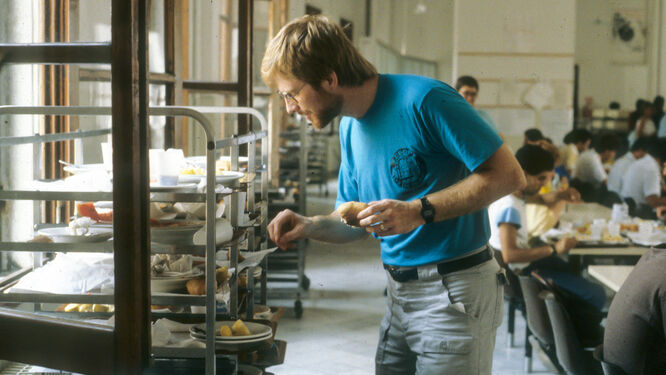The Dirty 30 — More Cheap Tricks
By Rick Steves
Ask your credit-card company about fees for overseas transactions. Hidden card fees can make that first post-trip statment a very unpleasant suprise.
Walking tours are usually cheaper and better than big bus tours. In general, arrange tours through the tourist office and not your hotel.
Baggage insurance is statistically the worst value among the many bad values in travel insurance. Don't insure baggage.
Travel faster in the more expensive north and hang out in the cheaper southern and eastern countries.
Don't buy new clothes, an overly fancy camera, or pricey gear for your trip. Use your tried and tested favorites.
Consider hotel salespeople who meet you at train stations and boat docks. They are generally simply working for decent places which have to hustle to get business. They may be new, not in the guidebooks, or even blacklisted by the tourist office because of their refusal to pay dues and a commission on business the tourist information office sends their way.
Bring toiletries from home to save both time and money.
Know the bonuses that come with rail passes. For instance, Eurail passes cover certain international boat crossings (e.g., Italy–Greece and Sweden–Finland) and cruises on Switzerland's lakes.
Leave home healthy and rested. The flight and jetlag make you vulnerable to catching a cold — a nuisance which will take the luster out of your first week in Europe. Considering the expense of your trip, leaving exhausted and catching a cold is an expensive mistake.
Treat vacation time like money — don't waste it. Know the simple tricks of avoiding museum lines. You'll find two IQs among tourists: those waiting in lines and those walking right by them because they made an entry appointment or have a museum pass that lets them go right in.
Take an overnight train to avoid the cost of a hotel and save a day in your itinerary. You have three sleeping options: a free airplane-style seat; a couchette — a bed in a six-person compartment for about $30; or a sleeper — a bed in a compartment with a double bunk for about $80. Trade away the sleeper privacy for a couchette and save $55.
Play backgammon in Greece and Turkey. It's free for the price of a glass of tea and gets you piles of new friends and teahouse memories.
Dine with students. Universities generally have a government-subsidized cafeteria (open to the public) serving the cheapest hot meals in town. Mensa is the universal word for government-subsidized cafeteria.
Tapas in Spain are ideal for a light, inexpensive meal served any time — handy for those wanting a meal in Spain before the standard 8 p.m. and later dinner hour.
Send back the extras. In Portugal, restaurants decorate your table with hard-to-resist hors d'oeuvres. While these seem like friendly freebies, they're carefully tallied. If you eat one, you've purchased the lot. Ask to have these removed…or pay the price.
Learn key words and numbers in the local language. You'll get more respect, people will like you more, and you're less likely to be ripped off.
Tour smart. Big bus tours are sold at a nearly no-profit price. They make their money throughout the tour on commissions from your shopping and by selling you optional sightseeing. While on tour, save big money by skipping the optional sightseeing tours and relying on your guidebook for independent sightseeing.
If renting a car, use the cardboard parking clock you'll find in your glove compartment. In many countries, parking signs indicate how long it's free to park providing you place the cardboard clock on your dash set to the time you arrived.
Avoid the CDW racket. To get a zero deductible on your rental car, Collision Damage Waiver supplements cost $15–35 a day. Instead, consider using your credit-card's built-in insurance.
Know the local word for tap water. While wine, beer and coffee are wonderful parts of the European experience, drinks cost travelers about $15 a day. Tap water, however, is free and drinkable almost everywhere. Use a refillable water bottle for juice and water.
See the modern art in Paris, London, Venice or Madrid, not in Bilbao. The great Guggenheim Modern Art Museum in Bilbao is impressive for its architecture, but the art is no better than what you'll see in other art capitals.
Spend coins before crossing a currency border. While you can always change paper currency, coins are generally worthless outside their domain. A €2 coin is worth nearly $3.
Use email to save money on long distance phone calls to Europe when booking accommodations. Even budget hotels use email to advise travelers on room availability.
Pack light. With a carry-on-the-plane size bag, you'll never struggle with porters or cabbies, you get more respect when shopping for a hotel room, and you can share train station lockers with your partner, cutting that expense in half.
Use the telephone to double-check guidebook information, availability of English-language tours, to make reservations and to comparison shop.
Locals wanting restaurant quality food at half the price get hot food to go at local delis. Enjoy good local cuisine at fast food prices with a carefully chosen picnic perch for dinner.
Eat near markets. Local shoppers and market workers alike know a good value and that's all that survives in the shadow of Europe's colorful marketplaces.
If you do a lot of shopping, you may be eligible to get a refund on the local Value Added Tax (usually around 20 percent) at the airport when you leave. For major purchases this can be well worth the paperwork. Local merchants explain the process.
Know your shipping rates. When mailing things home, book rate is much cheaper. You can often save money by sending two packages, with one being all the paper and printed stuff.
Wash laundry in the sink. Visits to the launderette cost needless time and money. Hotel laundry services can be expensive.

